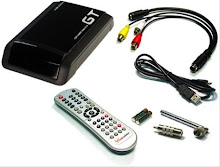Many people are buying expensive TVs and High Definition Video players, but are not able to get a signal, or are getting a low resoultion image. The problem is probably non-HDCP compliance. But what is HDCP?
HDCP stands for High Definition Content Protection. It was implemented by Intel Corporation and their subsidiary Digital Content Protection, LLC. Essentially, manufacturers and digital content producers agree to terms and conditions and pay a fee so that their content can be protected on the digital level.
The encryption is quite involved, employing 40 keys that each contain a 56-bit code. It's kind of like having a pin number that is 2240 characters long. Failure for manufacturers to keep this code a secret results in expulsion from the HDCP program. This HDCP code allows content to be more effectively protected from piracy using unauthorized digital equipment. For example, high-definition digital video sources can't transmit protected content to non-HDCP compliant receivers.
What this means for consumers, is they must make sure all of their video equipment is HDCP compliant, from the digital player, to the HDTV, to the connectivity equipment involved, like HDMI switches or splitters. The manufacturer of the equipment essentially has to buy a license from Digital Content Protection, LLC which will allow them to use an encryption decoding tool built into the firmware of the equipment, decoding the HDCP encryption. If the encryption is not encoded, the user will probably just see static, or a reduced resolution to 480p.
HDMI isn't the only video format that HDCP was formed to protect. If you are using DisplayPort, DVI (Digital Video Interface, GVIF (Gigabit Video Interface), or UDI (Unified Digital Interface) and you are experiencing the above problems, it could be that your equipment is not HDCP compliant.
Cameron Postelwait is the Content Manager of Sewell Direct, proud retailers of HDCP compliant video components, such as Gefen's EXT-HDMI-142 HDMI splitter
More info.
High-bandwidth Digital Content Protection - Wikipedia, the free ...
The specification is proprietary, and implementing HDCP requires a license. ... Each HDCP-capable device has a unique set of keys; there are 40 keys, ..
.en.wikipedia.org/wiki/HDCP -

What is HDCP and Why Are HDTV Manufacturers Using It?
Subscribe to:
Post Comments (Atom)
Labels
- ATSC tuner (1)
- Cable CARD Tuner (1)
- Dvico Fusion Dual HDTV DVB-T Tuner (1)
- Fusion HDTV (1)
- HDTV (2)
- HDTV PC Tuner Guide (1)
- HDTV Receiver (1)
- HDTV Tuner (2)
- HDTV Tuner Cards (2)
- HDTV Tuner Review (1)
- How an ATSC Tuner Works (1)
- New Technology (1)
- Samsung (1)
- samsung hdtv tuner cards (1)
- The Best HDTV Tuner for Your PC (1)
- Tuner (radio) (1)
- What is HDCP? (1)
Blog Archive
-
▼
2008 (62)
-
▼
March (7)
- The latest on the PC Cable CARD Tuner
- The Best HDTV Tuner for Your PC
- A Few Things Worth Knowing About The HDTV Tuner
- New Technology Provides Alternatives To HDTV DVD's
- What is HDCP and Why Are HDTV Manufacturers Using It?
- Dvico Fusion Dual HDTV DVB-T Tuner Review
- Watch HD Television Programming On Your PC With An...
-
▼
March (7)
0 comments:
Post a Comment